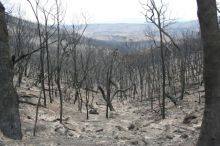Black Saturday: In the media spotlight
In the aftermath of the Black Saturday bushfires in Victoria on 7 February 2009, the Centre for Advancing Journalism at The University of Melbourne embarked on a two-part research project to discover the ethical issues that arose for journalists who covered the fires, and the impact of media exposure on survivors who were the subject of media reporting.
Stage I - How the media covered Australia's worst peace-time disaster

The February 2009 Black Saturday bushfires in Victoria was Australia’s worst peace-time disaster that left 173 people dead, more than 414 injured, over 1700 homes destroyed and an estimated 7000 people homeless. Coverage of Black Saturday was extensive and in many ways comprehensive. The journalists, photographers and television crews involved in the coverage faced major challenges in doing their work and were deeply affected by what they witnessed. They were faced with ethical questions, logistical problems and fundamental questions about how to cover a natural disaster so close to home.
The Centre has undertaken a significant research project aimed at exploring the experience of journalists, editors and news directors reporting on the Black Saturday fires. The goal of the research was to allow those involved in covering the fires to reflect on their experiences, the quality of the coverage, the pressures they faced, and any lessons they learned for future coverage of major disasters. The research findings were launched at a conference on November 19, 2010 involving representatives from media organisations and key emergency services involved in the Black Saturday bushfires.
- Read the Stage I, Executive Summary on How the Media Covered Australia’s Worst Peace-time Disaster (365kb pdf)
- Purchase Media Ethics and Disasters: Lessons from the Black Saturday Bushfires, by Dr Denis Muller
Stage II - The Survivor Stories
This report is about the impact of media exposure on survivors. It is based on qualitative research in the form of in-depth personal interviews with 27 survivors from eight bushfire-affected communities. The interviews were carried out shortly after the second anniversary of Black Saturday. The research was discussed at a community forum in Marysville on 21 September, 2011 at which bushfire-affected community members responded to the findings.
- Read Stage II, Executive Summary on The Survivor Stories (340kb pdf)
- Read the Methodology for Parts I and II (530kb pdf)
Journalism, trauma and the treatment of vulnerable people: A case study based on the coverage of Black Saturday
This publication, by Dr Denis Muller will integrate the two major research reports, one about how journalists who covered the Black Saturday bushfires responded to the ethical challenges they faced, and the other about the effects on survivors of their encounters with the media in the immediate aftermath of the fires. It recounts the way the tragedy of Black Saturday unfolded, and how the media coverage developed from the evening of Black Saturday through the weeks that followed. In the course of this narrative, large ethical issues emerge, and they are discussed from the point of view of the media practitioners and the survivors, in which the voices of both groups are heard directly.
One large ethical issue concerned the way media practitioners dealt with traumatised survivors, and how they handled their own emotional responses to these traumatic conditions. A significant part of this new book deals with these two sides of the trauma question, as well as the vexed question of consent. Another big issue concerned the relationship between media and emergency services personnel, which affected access to people, places and information. Other major issues concerned deception and intrusion.
Further reading
Media reports about the conference and our research study include:
- Muller, D. and Gawenda, M. “Ethical Free-for-all Over Media Access to the Firezone” (815kb pdf) published in Media international Australia, November 2010
- Stewart, C. “Untold stories of Victoria’s bushfire disaster,” in The Australian, 23 November 2009 (Online) Not available
- Munro, I. “Study finds media have no rules for disasters,” in The Age, 19 November 2009 (Online) Cited 06/02/2013
- Simons, M. “Journalists Adrift: The Reporting of Black Saturday" and “Humans First, Journalist Second. The Journalism of Black Saturday,” on crikey.com.au, 19 November 2009 (Online) Cited 06/02/2013
- Holmes, J. “Bushfire tragedy inspired the best from Australian journalists,” on The Drum, 23 December, 2009 (Online) Cited 28/04/2016